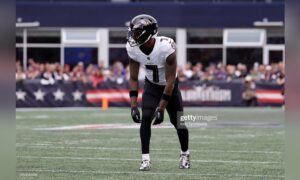By Matthew Marczi
While he may not have had an opportunity to demonstrate the full breadth of his skills on Saturday night, carrying the ball just twice, Pittsburgh Steelers running back Isaac Redman has hidden away a secret skill that has helped him throughout his career despite less than ideal athleticism: with the ball in his hands, he is an elusive runner.
In response to the drafting of running back Le’Veon Bell in the second round of this past draft, and as a means of helping him adapt to the new zone blocking scheme the Steelers intend to incorporate this season, Redman has stated that he has lost weight and worked with a speed trainer.
According to the fourth-year back, he has dropped about 20 pounds from a season ago, and he sees the results on tape, telling the Pittsburgh Tribune-Review, “it shows on film that I am a couple steps quicker than I was”. He also said that he believes “being a little quicker would actually help my power”.
The thought of Redman becoming an even more difficult back to bring down should be worrisome to opposing defenses, despite averaging just 3.7 yards per carry a season ago. Looking deeper into the statistics reveals a more nuanced understanding of Redman’s 2012 showing, which was bogged down by injuries.
Last year, Redman carried the ball 110 times and caught 18 passes. On those 128 touches, he forced a total of 38 missed tackles, with 28 coming on rushes and 10 on receptions. His 28 misses tackles on carries is impressive when you consider that the 13 backs with more missed tackles on carries all had at least 90 more carries than he did.
Adrian Peterson led the league with 64 missed tackles, but he ran the ball 348 times, which comes out to a missed tackle on 18.4 percent of his carries. Redman forced a missed tackle on more than 25 percent of his carries (LaRod Stephens-Howling also had 110 carries and forced 24 missed tackles).
In fact, Redman averaged 3.02 yards after contact on his 128 total touches, which ranked him seventh in the league out of backs who played 25 percent of the team’s snaps (Jonathan Dwyer ranked ninth with 2.78 yards after contact).
Redman’s yards after contact may be slightly inflated due to his one exceptional game in receiving, but when you consider that he averaged just 3.7 yards per carry, that is a substantial percentage of his yardage gained after being touched, a reflection of the team’s run-blocking woes.
Pro Football Focus attempts to quantify blocking-independent running back success, and to do so, they created a metric that they call Elusiveness Rating. The Elusiveness Rating divides missed tackles by touches and multiplies that by yards after contact per attempt, and multiplies by 100 to get a more workable figure.
At the end of the season, Redman was second only to Buffalo Bills running back C.J. Spiller in the Elusiveness Rating. Spiller’s rating was 94.6, and Redman’s was 89.6. Bernard Pierce of the Baltimore Ravens was a distant third with a rating of 75.7, followed by Peterson at 72 and Jacquizz Rodgers at 61.1.
Consider also the fact that Redman had just four carries of 15 yards or more, and on those four carries, he gained 91 of his 410 total yards on the ground. The fact that the vast majority of his missed tackles forced did not lead to much of a large gain gives an even greater appreciation for the frequency with which he was able to make would-be tacklers miss close to or behind the line of scrimmage.
Yes, many of those missed tackles were a result of Redman being able to overpower defenders; however, his mental acuity as a ball carrier often goes overlooked, given his typecasting as a short yardage back. Redman also combines strong footwork, quick decision-making, and field vision to make the most of his carries.
His aptitude for staying on his feet, consistently giving a second or third effort, and chronically falling forward when he is brought down are all instinctive qualities in a running back that coaches covet. It is why Redman is being shown the respect of being named co-starter with Bell, who will inevitably be named the starter by the time the regular season begins.







